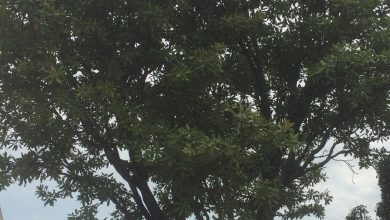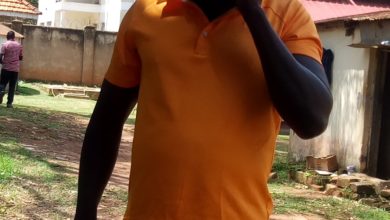Entertainment
A TALE OF TWO WARS: SUDANESE REFUGEE CAUGHT ON SURVIVAL

Rita as a lost generation was born in Khartoum in Sudan and found herself in South Yei where her mother Awata Jennifer passed on.
By Okumu Langol Livingstone
GULU-UGANDA: Masim Sadik Taman 24, fled the 2010 Darfur war when bomb shells and jet fighters began dropping artilleries in schools in Nubian Mountain of Western South Sudan.
“Students scattered as some ran to their homes were equally abandoned. The parents had fled for their lives.”
Sadik was fifteen years old and with her five toddling brothers and sisters’ sort for aloof or tarmac road in Darfur in search of vehicle to south Sudan.
“We spent five days by roadside and saw SPLA vehicle which carried us” she says “unfortunately the soldiers ran in ambush and many were shot.”
Sadik says those shot in the vehicle were picked and thrown away. “But I survived!” says Sadik. She says she fed on sorghum and dry maize and drunk water which was in the truck.
She says after a week long struggle they reached Juba SPLA Barrack and spent a month there during that time the soldiers made announcements for relatives to come and collect them.
“A good Samaritan came a man called Janabu Mohamed and reclaim us because he is from Nubian Mountain,” she said.
In Janabu’s home were many who took refuge with him and attempt to get education was futile. Sadik then started working as a house maid with Janabu to get penny to pay her sisters and brothers to school.
In 2013 when the war broke out in Southern Sudan, they had stayed near a Military barrack and Janabu decided to put them on truck to Uganda as refugees.
“We arrived in Arua town at 2:00am in the night and we slept on the street” she said “we begged people to show us Rhino Camp refugee settlement.”
Sadik was then taken to Ocer refugee settlement camp and live on petty business to find school fee but in vain.
In 2015, when my brothers returned from school informed her that there was an NGO recruiting vulnerable children for scholarship.
“I begged them to register me which I filled a form and I received a call to go to Arua town but I did not have money to travel” she said “I went in the community and herded cattle for money and raised Ug5000.”
Sadik walked her journey to Arua town at night because the money was too little to transport her.
Then Hope for Change the sponsor asked her to select a one year short course and she chose Agriculture with hope to return home from refuge to start a new life.
Three months later, after completion of the course, Sadik enrolled for a certificate in Agriculture at Arua innovative Institute of Agriculture.
“My dream now is to get a national certificate in Agriculture. Albert Kansiime offered me one million and I bought five goats which I sell for fees,” Sadik said.
Sadik is skewed by the decision by the Global Fund for children affected by conflict to end scholarship will affect her dream.
“I am lucky the CBO has taken me away from plastering someone house for money,” Sadik said.
“Now Iam a manager of my own farm,” said says.
Tabu Rita 21, is a student of Kitara SS in Hoima district in Ruwenzori Region, as a refugee girl, she lost all her parents to South Sudan war.
Rita as a lost generation was born in Khartoum in Sudan and found herself in South Yei where her mother Awata Jennifer passed on.
However, her aunty Doya Agnes who took control of her and other brothers but never wanted her to study.
“She could curse me to fail in my study and wanted me to sell goods on the market, “she says “but I vowed to be an Umbrella.”
Rita says she decided to join her brothers who were traders and when she raised little money, she paid her fees in primary seven where things became tough.
She relocated from Yei to Kyakabale refugee camp in Hoima district where her aunty authorized her to be family head taking care of all children at home as she went her way for business.
“She never wanted me to study. Every week I plastered people’s houses and fetched water for money,” she says.
“When I return home, my aunt would say I delayed and made me to work in local hotel for two months as punishment,” she says
After her primary seven Leavers certificate, Rita was taken by one Daniel a social worker with a community based organization Cobras international youth organization to transform Africa for a scholarship.
Despite this opportunity, her aunt still stood in opposition of Rita’s favour. Neither Rita’s aunt nor the NGO provided her with scholastic materials but one Daniel’s wife.
She was pick and offered scholarship from Senior one to senior five where the decision by the Global Fund to cut off aid will affect her.
“There is no other way if this scholarship ends this way. Yet my dream is to become a minister in my own country,” Rita says.
The NGO representatives through which the scholarship program is running have described it a tough moment.
Wawo Acellam, executive director for Hope and Peace for Humanity based in Gulu says they will redesign their existing program activities to fit within local government programs to breach the gap
“It’s a tough decision however, this gives us another thought to streamline our projects in line with those of local government to move on,” Wawo says
“My appeal to the donors is that when they sponsor students, let it be holistic,” heads.
Joy Akwerorowth of Rural Initiative for Community empowerment in Arua district says the beneficiaries were informed of the period of the scholarship.
“Every beneficiaries are aware that the scholarship is for five terms and I hope they are somewhere” says Akwerorwoth.
Meanwhile the Vice President of Global Fund for Children in conflict affected area Core Oser says the end of the scholarship should not deter the girls from realizing their dreams.
“I believe the girls are able to stand on their own and they should continue to network with their organizations and community to move forward” she says.
“These needs can not only be addressed by a single source of funding” she says
Core says the CBOs should link with the Local government to take over funding of the girls.
The aim of the review meeting at Bomah Hotel in Gulu district is to prevent marginalized conflict affected girls from attaining academic and entrepreneurial opportunity to make them change makers and self-reliant.




